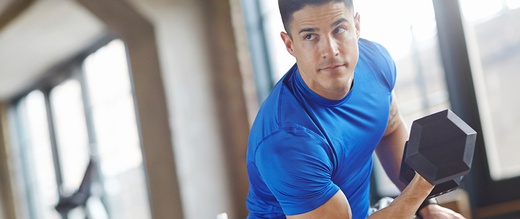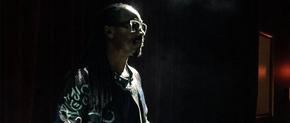The views expressed in our content reflect individual perspectives and do not represent the authoritative views of the Baha'i Faith.
Usually I do my workouts at a small, humble gym in the little town I live in, but the other day I made a trip to a nearby city and saw one of those new temples of physical fitness. Strangely, it reminded me of a few medieval European cathedrals I’ve visited.
Have you seen these mega-gyms? They’re enormous, scaled like the grand cathedrals of old. Some have columns and soaring lobbies and marble everywhere, and one I heard about even has gold-plated fixtures in the locker rooms. The gym/temple I saw the other day—its massive size and its luxury and the sheer statement it makes about our priorities in life—really made me wonder about the direction of our society.
Unlike a house of worship, where we glorify the mystical and the spiritual, this lavish body-worshipper’s palace had floor-to-ceiling windows that glorified the physical. In a house of worship, the architecture focuses human attention on the sacred, the numinous, the spiritual. In this gigantic gym—I swear it takes up a whole city block—the architect decided to focus our attention on the cult of the body, by building the entire gym out of glass. The huge see-through structure, with its exercise machines all facing out, draws the eyes of passing people to the hundreds of striving customers inside. Lit up at night like a beacon of hope, it seemed to promise something beyond fitness, some beatific vision of the possibility of achieving physical perfection and thereby overcoming every possible problem.

All that glass showing all those sweaty strivers probably works as an effective marketing tactic, of course, but it also plays to human vanity. When people work out relentlessly, sculpting their bodies to look like they’ve been photo-shopped, they usually want to be seen—and these cathedrals of holy body culture make that possible, putting them on display, making them into moving department store mannequins.
This kind of reverence for the physical—the holy church of the cult of the body—turns our focus toward one thing, the size and shape of our exterior physique. It shrinks reality into a single small, narrow point of convergence. It idolizes the material and forgets the transcendent. Perhaps those who limit their focus to the cult of the body find the world an easier and less frightening place, I don’t know. But I do know that attractiveness and fitness and that healthy glow can’t ever replace what’s inside.
A lean, athletic body cannot substitute for empathy, for kindness, for a loving heart, for a fulfilled soul. You might be totally ripped or stunningly beautiful, but what lasting good does it do you if you haven’t expended an equal amount of effort on your spiritual growth? Will it make you happy, in a sustained and deep way? Will it create a fulfilled life? Do you think that a perfect physical body will somehow allow you to avoid aging or illness or death? Such shallowness and surface-focused attention to the physical, once it goes beyond the bounds of moderation, only takes away from the deeper and more lasting purpose of life:
…the purpose of this life is not to attain high position, wealth and physical happiness; nor are eating, sleeping and enjoying the fellowship of the physical body, the only things to be desired. The purpose and end of the world of creation is spiritual life, knowledge of God, love of God, fear of disobedience to God and the perfections of the world of humanity. Should man characterize himself with these lofty qualities and virtues, the physical conditions will, undoubtedly, not seem interesting to him and he will detach himself from them. His heart will become illumined with the light of God; he will hear the call of the unseen joy and will become the centre of the names and attributes of God. – Abdu’l-Baha, Star of the West, Volume 5, pp. 35-36.
The Baha’i teachings recommend “moderation in all things.” Baha’is don’t deny the physical, try to become ascetics, renounce the world or abstain from pleasure. Many Baha’is work as professional athletes and dancers and gymnasts and fitness instructors, so Baha’is appreciate the value of the human body and its abilities. Baha’is simply believe that our bodies should not excessively limit us to this physical world and deprive us of our relationship to the next world:
It must be remembered, however, that the maintenance of such a high standard of moral conduct is not to be associated or confused with any form of asceticism, or of excessive and bigoted puritanism. The standard inculcated by Baha’u’llah seeks, under no circumstances, to deny anyone the legitimate right and privilege to derive the fullest advantage and benefit from the manifold joys, beauties, and pleasures with which the world has been so plentifully enriched by an All-Loving Creator. “Should a man,” Baha’u’llah Himself reassures us, “wish to adorn himself with the ornaments of the earth, to wear its apparels, or partake of the benefits it can bestow, no harm can befall him, if he alloweth nothing whatever to intervene between him and God, for God hath ordained every good thing, whether created in the heavens or in the earth, for such of His servants as truly believe in Him. Eat ye, O people, of the good things which God hath allowed you, and deprive not yourselves from His wondrous bounties. Render thanks and praise unto Him, and be of them that are truly thankful.” – Shoghi Effendi, The Advent of Divine Justice, p. 33.
Next: From Body to Spirit; From Illusion to Reality

















Comments
Sign in or create an account
Continue with Facebookor